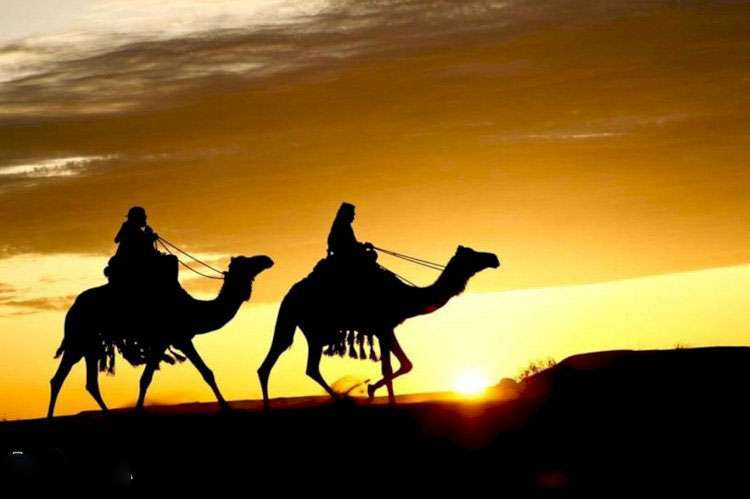Today marks the anniversary of Karbala Massacre


Hussain ibn Ali, the grandson of Prophet Muhammed (PBUH) and a 7th century revolutionary leader, was martyred in The Battle of Karbala in today’s Iraq in A.D. 680.
The martyrdom of Hussain ibn Ali is commemorated annually by millions of Muslims on the 10th day of Moharram, which also known as Ashura.
What happened in Karbala?
Prior to his death, the Umayyad caliph Muawiyah I had nominated his son Yazid as his successor. Yazid's nomination was contested by the sons of a few prominent companions of Muhammad, including Hussain, son of the fourth caliph Ali, and Abd Allah ibn Zubayr, son of Zubayr ibn al-Awam.
The Battle of Karbala took place within the crisis environment resulting from the succession of Yazid I. Immediately after succession, Yazid instructed the governor of Medina to compel Hussain and a few other prominent figures to pledge their allegiance (Bay'ah).
Hussain, however, refrained from making such a pledge, believing that Yazid was openly going against the teachings of Islam and changing the sunnah of Muhammad. He, therefore, accompanied by his household, his sons, brothers, and the sons of Hasan left Medina to seek asylum in Mecca.
On the other hand, the people in Kufa, when informed of Muawiyah's death, sent letters urging Hussain to join them and pledging to support him against the Umayyads. Hussain wrote back to them saying that he would send his cousin Muslim ibn Aqeel to report to him on the situation and that if he found them supportive as their letters indicated, he would speedily join them because an Imam should act in accordance with the Quran and uphold justice, proclaim the truth, and dedicate himself to the cause of God. The mission of Muslim was initially successful and according to reports, 18,000 men pledged their allegiance. But the situation changed radically when Yazid appointed Ubayd Allah ibn Ziyad as the new governor of Kufa, ordering him to deal severely with Ibn Aqeel.
In Mecca, Hussain learned assassins had been sent by Yazid to kill him in the holy city in the midst of Hajj. Hussain, to preserve the sanctity of the city and specifically that of the Kaaba, abandoned his Hajj and encouraged others around him to follow him to Kufa without knowing the situation there had taken an adverse turn.
On the way, Hussain found that his messenger, Muslim ibn Aqeel, had been killed in Kufa. Hussain encountered the vanguard of the army of Ubaydullah ibn Ziyad along the route towards Kufa. Hussain addressed the Kufan army, reminding them that they had invited him to come because they were without an Imam. He told them that he intended to proceed to Kufa with their support, but if they were now opposed to his coming, he would return to where he had come from. In response, the army urged him to proceed by another route. Thus, he turned to the left and reached Karbala, where the army forced him not to go further and stop at a location that had limited access to water.
Ubaydullah ibn Ziyad, the governor instructed Umar ibn Sa'ad, the head of the Kufan army, to offer Ḥusayn and his supporters the opportunity to swear allegiance to Yazid. He also ordered Umar ibn Sa'ad to cut off Hussain and his followers from access to the water of the Euphrates. On the next morning, Umar ibn Sa'ad arranged the Kufan army in battle order.
The Battle of Karbala lasted from morning to sunset on October 10, 680 (Muharram 10, 61 AH). Hussain's small group of companions and family members (in total around 72 men and the women and children) fought against a large army under the command of Umar ibn Sa'ad and were martyred
near the river (Euphrates), from which they were not allowed to get water. The renowned historian Abū Rayḥān al-Bīrūnī states:
… Then fire was set to their camp and the bodies were trampled by the hoofs of the horses; nobody in the history of the human kind has seen such atrocities.
Once the Umayyad troops had martyred Hussain and his male followers, they looted the tents, stripped the women of their jewelry, and took the skin upon which Zain al-Abidin was prostrate. Hussain's sister Zaynab was taken along with the enslaved women to the caliph in Damascus when she was imprisoned and after a year eventually was allowed to return to Medina. (ILKHA)
LEGAL WARNING: All rights of the published news, photos and videos are reserved by İlke Haber Ajansı Basın Yayın San. Trade A.Ş. Under no circumstances can all or part of the news, photos and videos be used without a written contract or subscription.
The Hijrah—the historic migration of Prophet Muhammad (peace be upon him) from Mecca to Madinah in 622 CE—stands as a luminous milestone in Islamic history, igniting the flame of hope in the hearts of early Muslims and serving as an enduring example for all generations of believers.
Türkiye today marks the 63rd anniversary of the May 27, 1960 military coup—a day many regard as a deep betrayal of democracy, justice, and the national will.
Today marks the 29th anniversary of the martyrdom of Dzhokhar Dudayev, the founding leader of the independent Chechen Republic of Ichkeria and an enduring icon of resistance against Russian imperialism.
As the crescent moon of Ramadan fades and the celebration of Eid al-Fitr draws near, Muslims around the world are focusing on one of Islam’s holiest occasions: Laylat al-Qadr, the Night of Power or Night of Decree.